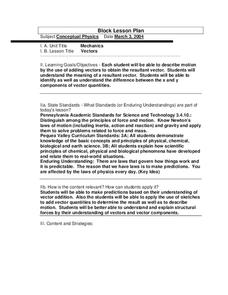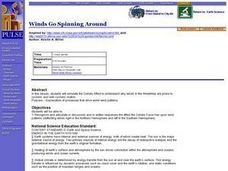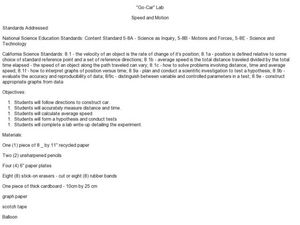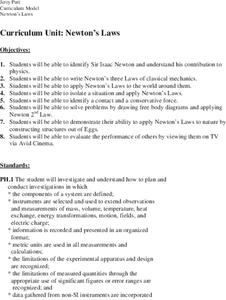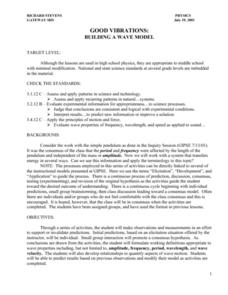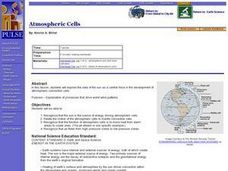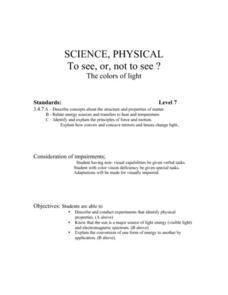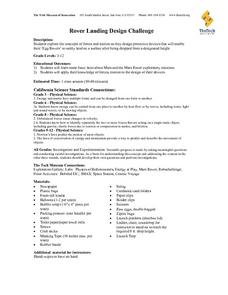NASA
Measuring Dark Energy
You're only 10 minutes late? Do you know how much the universe has expanded in those 10 minutes? Scholars graph supernovae based on their redshift and see if the results verify Hubble's Law. If it does confirm it, the universe is...
University of Colorado
Distance = Rate x Time
Every year, the moon moves 3.8 cm farther from Earth. In the 11th part of 22, classes use the distance formula. They determine the distance to the moon based upon given data and then graph Galileo spacecraft data to determine its movement.
Curated OER
Falling
Students should describe the path that the motion would take as well as what might begin or stop the motion. The common characteristic of all the motions that students have experienced directly is that one or more forces are acting on...
Curated OER
Numerical Determination of Drag Coefficients
Learners create a video of an object falling with a drag. In this physics instructional activity, students calculate drag coefficient using data from Logger Pro. They calculate velocity and acceleration of the object.
Curated OER
Vectors
Students describe motion by the use of adding vectors. They identify the difference between the x and y components of vector quantities. Students are given the Paper Bridge Building handout and the instructions as to where to perform...
Curated OER
Lab for Truss Design and Testing
Students design and build their own truss. In this physics lesson, students calculate the forces and maximum load. They complete a full scale diagram of their design.
Curated OER
2D Kinematics w/ String Racers
Students calculate the speed of string racers. In this physics instructional activity, students measure the time in several trials and get the average. They graph their results using a spreadsheet.
Curated OER
A Message in a Bottle
Young scholars investigate the motion of water currents by mapping the possible movement of messages cast into the ocean in bottles.They accurately plot the appearance of bottles on a world map and illustrate the flow of an ocean...
Curated OER
Impulse/Momentum Lab
Students investigate the relationship between force and momentum using motion detectors and sensors. In this physics lesson, students graph experimental results. They calculate impulse using the area under the graph.
Curated OER
Newton's Third Law
Students describe an everyday situation which demonstrates Newton's Third Law. They state Newton's Third Law;"Every action has an equal and opposite re-action, or every force has an equal and opposite force" in their own words. ...
Curated OER
Rube Goldberg Project
Students apply inquiry and problem solving approaches in science. They design a device (invention) that solves a special problem.
Curated OER
Newton's Theory of Universal Gravitation
Students explore how Newton tied together the gravity observed on Earth and the motion of the Moon. They apply an earlier lesson about centripetal forces.
Curated OER
Electric Field Mapping in 3D
Students create a 3D vector field map of an electric field. In this physics lesson, students measure the voltage inside an aquarium with water. They present their findings and map to class..
Curated OER
Building And Launching a Model Rocket
Students are introduced to the basic parts of rockets and the physical forces at work in the flight of rockets. They build and launch a model rocket and discuss the challenges of launching a real rocket.
Curated OER
Winds Go Spinning Around
High schoolers simulate the Coriolis Effect to comprehend why winds in the Westerlies are prone to cyclonic and anti-cyclonic motion. They arrive at an explanation of processes that drive world wind patterns
Curated OER
Jet Engine Magazine
Students explore physics by creating a magazine cover in class. In this flight lesson, students identify the motion and force that must be generated in order for a jet engine to lift off the ground. Students create a cover for a...
Curated OER
"Go-Car" Lab
Students construct a car based on directions given. In this physics lesson, students calculate average speed using distance and time information. They collect data and create a graph of distance vs. time.
Curated OER
Newton's Laws
Students examine and discuss Newton's Laws and discover his contribution to physics. In groups, they participate in an experiment in which they much apply the Laws to the world around them. They describe contact and conservative forces...
Curated OER
Airplanes
Fourth graders experiment with gravity and lift by building paper airplanes. In this physics instructional activity, 4th graders compare the falling rate of a crumpled vs. flat sheet of paper. Then after class discussion and...
Curated OER
Good Vibrations: Building a Wave Model
Pupils assess and apply recurring patterns in natural systems. They evaluate the wave properties of frequency, wavelength, and speed as applied to sound. Students develop a relationship to quantify aspects of wave motion. They predict...
Curated OER
Atmospheric Cells
Students recognize that the sun is the source of energy driving atmosphere cells. They relate the motion of the atmospheric cells to mantle convection cells. Students recognize that the function of atmospheric cells is to move heat from...
Curated OER
Biodiesel Combustion and Its Influences in NOx Emissions
Tenth graders evaluate the physical mechanisms that cause a change in NOx emissions. In this combustion lesson, 10th graders participate in a research project. Students create a presentation of their findings.
Curated OER
To See or Not to See: The Colors of Light
Seventh graders describe and conduct an experiment that identifies the physical properties of light. They explore sources of visible light and an electromagnetic spectrum. Students explain the conversion of one form of energy to another.
Curated OER
Rover Landing Design Challenge
Students examine the concepts of forces and motion. They work together to design protective devices for their egg rovers as they are dropped from a specific height. They record their observations and discuss.




